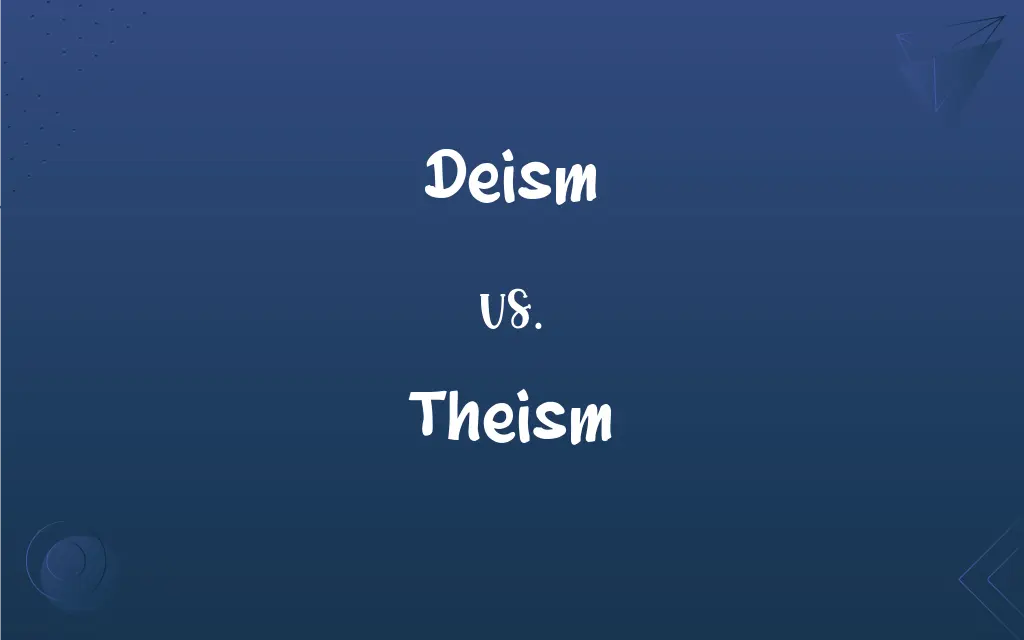Deism vs. Theism: What's the Difference?
Edited by Aimie Carlson || By Janet White || Published on December 19, 2023
Deism refers to belief in a creator who does not intervene in the universe. Theism refers to belief in a creator who intervenes in the universe.

Key Differences
Deism posits a divine creator who, after establishing the universe, remains non-interventionist, leaving it to operate according to natural laws. Theism, in contrast, believes in a God actively involved in the universe and human affairs.
Deism views God more as an initial cause, a distant and uninvolved figure post-creation. Theism, however, sees God as a personal, continually engaged entity in the workings of the world.
The concept of miracles differentiates them significantly; deism generally rejects miraculous interventions, whereas theism often embraces such occurrences as acts of God.
In deism, revelation and religious texts are not considered divinely inspired, but in theism, they are often viewed as the word of God and central to religious practice.
Prayer and worship practices differ; deists typically do not believe in the effectiveness of prayer in influencing the divine, while theists often see prayer as a vital communication with God.
ADVERTISEMENT
Comparison Chart
Concept of God
Creator who does not intervene
Creator who intervenes
Miracles
Generally rejected
Often accepted
Revelation
Not divinely inspired
Considered divinely inspired
Prayer and Worship
Not emphasized
Central to practice
View of Religious Text
Generally symbolic, not literal
Often viewed as literal and sacred
ADVERTISEMENT
Deism and Theism Definitions
Deism
Deism is a philosophical position emphasizing natural theology.
The intricacies of nature in deism point to a creator but not to ongoing divine involvement.
Theism
Theism encompasses religions with a personal, interventionist deity.
Prayer in theism is often seen as a means of divine communication.
Deism
Deism acknowledges a creator but denies supernatural revelation.
A deist may believe in God but not in the miracles described in religious texts.
Theism
Theism is the belief in a God actively involved in the universe.
In theism, natural disasters might be interpreted as acts of divine will.
Deism
Deism is the belief in a remote God detached from human affairs.
In deism, prayer is seen more as meditation, without expectation of divine response.
Theism
Theism often involves the belief in divine revelation through sacred texts.
Theists may follow religious scriptures as literal words from God.
Deism
Deism is the belief in a supreme being who does not interact with the world.
In deism, the universe operates independently of divine intervention.
Theism
Theism includes faiths that believe in miraculous interventions.
Miracles in theism are seen as direct actions of God in the world.
Deism
Deism asserts a God who created the world but does not govern it.
Deists argue that moral laws are inherent in the world, not commanded by God.
Theism
Theism usually entails the belief in a responsive deity, engaged in human affairs.
Theists often seek divine guidance through prayer in decision-making.
Deism
A religious belief holding that God created the universe and established rationally comprehensible moral and natural laws but does not intervene in human affairs through miracles or supernatural revelation.
Theism
Belief in the existence of a god or gods, especially belief in a personal God as creator and ruler of the world.
Deism
A philosophical belief in the existence of a god (or goddess) knowable through human reason; especially, a belief in a creator god unaccompanied by any belief in supernatural phenomena or specific religious doctrines.
Theism
Belief in the existence of at least one deity.
Deism
Belief in a god who ceased to intervene with existence after acting as the cause of the cosmos.
Theism
(narrowly) Belief in the existence of a personal creator god, goddess, gods and/or goddesses present and active in the governance and organization of the world and the universe. The God may be known by or through revelation.
Deism
The doctrine or creed of a deist; the belief or system of those who acknowledge the existence of one God, but deny revelation.
Theism
A morbid condition resulting from excessive consumption of tea.
Deism
The form of theological rationalism that believes in God on the basis of reason without reference to revelation
Theism
The belief or acknowledgment of the existence of a God, as opposed to atheism, pantheism, or polytheism.
Theism
The morbid condition resulting from the excessive use of tea.
Theism
The doctrine or belief in the existence of a God or gods
FAQs
Do deists believe in miracles?
Deists typically reject the notion of miracles, viewing the universe as governed by natural laws.
How do deists view religious texts?
Deists usually see religious texts as human creations, not as divine revelations.
What is deism?
Deism is the belief in a creator God who does not intervene in the universe.
How do deists understand the creation of the universe?
Deists believe the universe was created by a divine being but is now self-operating.
Is prayer important in theism?
Yes, prayer is often central in theism as communication with God.
Can a deist believe in a personal god?
Deism typically involves belief in an impersonal god, detached from human affairs.
Can a theist believe in an impersonal god?
Theism generally involves belief in a personal, responsive god.
What is theism?
Theism is the belief in a creator God who is actively involved in the universe.
How do theists view religious texts?
Theists often regard religious texts as inspired or revealed by God.
Do theists believe in miracles?
Yes, theists often believe in miracles as manifestations of divine intervention.
Is prayer important in deism?
In deism, prayer is not typically seen as a means of influencing the divine.
Do theists participate in organized religion?
Theists frequently participate in organized religions with shared beliefs and practices.
How does theism differ from atheism?
Theism involves belief in a personal, interactive deity, which atheism rejects.
Can deism include belief in Jesus?
Deists may acknowledge Jesus as a moral teacher but not as divine.
How does deism differ from atheism?
Deism involves belief in a creator, whereas atheism denies the existence of a deity.
Do deists participate in organized religion?
Deists often do not adhere to organized religion, emphasizing personal philosophy.
Do deists believe in an afterlife?
Beliefs about the afterlife vary among deists, but it's not a central tenet.
Do theists believe in an afterlife?
Many theistic religions include belief in an afterlife.
How do theists understand the creation of the universe?
Theists believe in a divine creation and often see God as continuously involved in its governance.
Can theism include belief in Jesus?
In Christian theism, Jesus is central as the son of God and savior.
About Author
Written by
Janet WhiteJanet White has been an esteemed writer and blogger for Difference Wiki. Holding a Master's degree in Science and Medical Journalism from the prestigious Boston University, she has consistently demonstrated her expertise and passion for her field. When she's not immersed in her work, Janet relishes her time exercising, delving into a good book, and cherishing moments with friends and family.
Edited by
Aimie CarlsonAimie Carlson, holding a master's degree in English literature, is a fervent English language enthusiast. She lends her writing talents to Difference Wiki, a prominent website that specializes in comparisons, offering readers insightful analyses that both captivate and inform.







































































